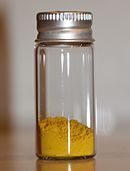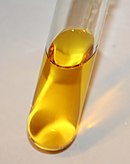Auramine O
 |
|||
|
|||
| Names | |||
|---|---|---|---|
|
IUPAC name
bis[4-(dimethylamino)phenyl]methaniminium chloride
|
|||
| Other names
auramine hydrochloride, basic yellow 2, pyocatanium aureum, aizen auramine, pyoktanin yellow, canary yellow, pyoktanin, or C.I. 41000
|
|||
| Identifiers | |||
|
2465-27-2 |
|||
| 3D model (Jmol) |
Interactive image Interactive image |
||
| ChemSpider |
16254 |
||
| ECHA InfoCard | 100.017.789 | ||
| PubChem | 17170 | ||
|
|||
|
|||
| Properties | |||
| C17H22ClN3 | |||
| Molar mass | 303.83 g·mol−1 | ||
| Melting point | 267 °C (513 °F; 540 K) | ||
| Hazards | |||
| R-phrases | R22 R24 R40 | ||
| S-phrases | S36/37 S45 | ||
|
Except where otherwise noted, data are given for materials in their standard state (at 25 °C [77 °F], 100 kPa).
|
|||
|
|
|||
| Infobox references | |||
Auramine O is a diarylmethane dye used as a fluorescent stain. In its pure form, Auramine O appears as yellow needle crystals. It is very soluble in water and soluble in ethanol.
Auramine O can be used to stain acid-fast bacteria (e.g. Mycobacterium, where it binds to the mycolic acid in its cell wall) in a way similar to Ziehl-Neelsen stain. It can also be used as a fluorescent version of Schiff reagent.
Auramine O can be used together with Rhodamine B as the Truant auramine-rhodamine stain for Mycobacterium tuberculosis. It can be also used as an antiseptic agent.
...
Wikipedia


